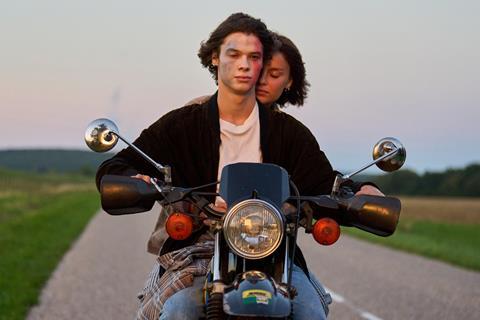Small town in France, bad teenage decisions for the third feature by the Boukherma twins

Dirs/scr: Zoran Boukherma, Ludovic Boukherma. France. 2024. 144 mins.
Over four sullen, humid summers in the fictional post-industrial French small town of Heillange, the lives of a group of teenagers are disrupted by the first stirrings of romance and a series of catastrophically bad decisions. And Their Children After Them is a big, sweeping melodrama which, although undeniably cinematic, struggles to sustain audience engagement throughout its overly generous running time.
Struggles to sustain audience engagement
Adapted from a novel of the same title by Nicolas Mathieu, And Their Children After Them is a period piece set over an extended time frame. As such, it’s a step up in ambition for the Boukherma twin brothers, whose two previous features include the Sitges prize-winning werewolf movie Teddy and the comedy Willy 1er. This is a film which, while rooted in a stultifying backwater in France, takes inspiration from tales of blue collar Americana, both in music choices – Bruce Springsteen takes pride of place at a pivotal moment – and in the violent swagger of the story-telling. But despite the clear influence of American cinema, the picture will likely play most successfully in francophone territories where the reputation of Mathieu’s Prix Goncourt–winning novel should be a selling point.
Shot in Lorraine, West France, the story unfolds in the shadow of the cadaverous framework of abandoned industry, now left to rot as a looming reminder of the area’s former prosperity. Anthony (Paul Kircher), fourteen when we meet him in 1992, is smitten and inarticulate when he first encounters Steph (Angelina Woreth). So smitten that he steals his father’s beloved motorbike to meet her at a party, a reckless act that sets in motion a bloody chain of events.
Where the film works best is in its evocative choice of location. There’s a sense that many of the problems that the kids in the town now face stem from the closure of the factories and the subsequent neglect of the community – these are children who grew up with fathers whose disappointment long ago hardened into anger and violence (which, in the case of Anthony’s father, played by Gilles Lellouche, is fueled by alcohol). Boredom is a constant, in a place where there’s nothing to do beyond flicking cigarette butts into the stagnant, scum-covered lake. It’s no wonder that the boys go off the rails.
But even so, and even taking into account the mitigating factor of hormonal adolescent idiocy, Anthony, goaded by his cousin (Louis Memmi), is a complete dumbass. And while it’s not exactly hard to believe that a young-for-his-age 14-year-old would do some seriously stupid things, it’s not always easy to care about him, or indeed any of the characters.
The problem is that, despite the extended period of time that we spend in their company, we don’t get to know them in any real and significant depth. Steph is certainly pretty, but we need to grasp more about who she actually is in order to understand Anthony’s all-consuming crush on her – or to have the patience to sit through their interminable Bastille Day slow dance. Hacine (Sayyid El Alami), a teenager of Moroccan descent who, following a run in at a teen party, becomes Anthony’s mortal enemy, rarely gets to do much in the film beyond lash out with explosive bouts of violence. And although Anthony is the focus of the story, he’s a frustratingly blank slate for much of the picture. We learn most about Anthony and the life that has shaped him from watching his mother Helene (an impressive Ludivine Sagnier) – a brash, big-hearted tough cookie, she has the weary watchfulness that comes from living with a man who talks with his fists.
The period, evoked mainly through boxy little cars and Sega consoles, is captured in one memorable scene by the use of a track by the Red Hot Chilli Peppers. Elsewhere, the music is more eclectic: Iron Maiden’s 80s stomper ’Run For The Hills’ is an on-the-nose choice to accompany a scene of teen delinquency, but it launches the film with a jolt of rowdy energy. Less successful are a couple of cover versions – The Pixies’ ’Where Is My Mind’ and Gloria Gaynor’s’I Will Survive’ are mutilated with lachrymose piano and warbling choirs – both of which feel oddly out of tune with the messy teen chaos on screen.
Production companies: Tresor Films, Chi-Fou-Mi Productions
International sales: Charades sales@charades.eu
Producers: Alain Attal, Hugo Selignac
Cinematography: Augustin Barbaroux
Production design: Jeremie Duchier
Editing: Geraldine Mangenot
Music:A maury Chabauty
Main cast: Paul Kircher, Angelina Woreth, Sayyid El Alami, Gilles Lellouche, Ludivine Sagnier, Louis Memmi















![[L-R]: Amanda Villavieja, Laia Casanovas, Yasmina Praderas](https://d1nslcd7m2225b.cloudfront.net/Pictures/274x183/6/4/1/1471641_pxl_20251224_103354743_618426_crop.jpg)








